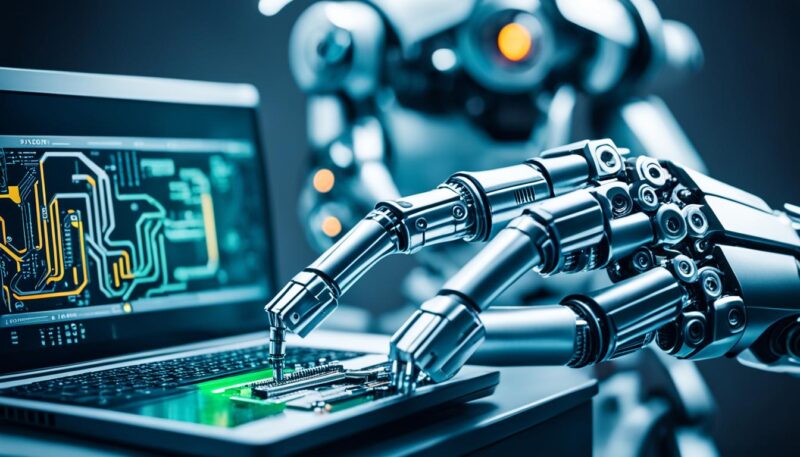Imagine a world where your software deployment cycles are not just expedited but also remarkably accurate. For many developers, this scenario could transform stress into triumph. The convergence of AI in DevOps is turning this dream into reality, heralding a dawn of unprecedented efficiency and speed. As organizations strive to stay competitive, AI-driven workflows are becoming the cornerstone of modern DevOps strategies. This integration is more than just a technical upgrade; it’s a monumental shift towards a future where intelligent automation propels productivity and innovation to unparalleled heights.
The allure of AI in DevOps lies in its ability to autonomously manage mundane tasks while processing vast data quantities at breakneck speeds. By embedding AI into the DevOps pipeline, organizations are witnessing reduced deployment times and error margins. For instance, Large Language Models like ChatGPT now provide coding assistance, optimizing software development by suggesting code snippets and identifying errors seamlessly.
However, leveraging AI in DevOps comes with its own set of challenges. Trusting the “black box” nature of AI and ensuring quality data input are significant hurdles. Nevertheless, with proper human oversight and closing the skills gap, these challenges can be mitigated. Ultimately, AI’s role in DevSecOps––through automated security monitoring and policy enforcement––cannot be understated, ensuring that the integration of these technologies not only boosts speed but also fortifies security.
Key Takeaways
- The integration of AI in DevOps significantly boosts efficiency and speeds up deployment cycles.
- AI-driven workflows enable autonomous management of mundane tasks and rapid data processing.
- Tools like ChatGPT enhance the software development lifecycle by providing coding assistance.
- AI’s role in DevSecOps is crucial for automated security monitoring and policy enforcement.
- Human oversight and addressing the skills gap are essential when integrating AI with DevOps.
The Role of Automation in DevOps and AI
In the ever-evolving landscape of technology, the integration of AI into DevOps automation has proven to be a game-changer, making the automation of DevOps tasks more efficient and intelligent. By leveraging AI tools for DevOps, teams can ensure that their processes are not only faster but also smarter, adapting to real-time demands and reducing manual oversight.
AI-Driven Automation
One of the most significant advancements is AI-driven automation. AI tools can dynamically prioritize tasks, ensuring that urgent issues are addressed promptly across developmental life cycles. Additionally, real-time monitoring systems enhanced with AI capabilities provide smart alert mechanisms, reducing alert fatigue by focusing attention on critical issues.
Benefits of Intelligent Task Delegation
The benefits of intelligent task delegation are immense. AI technologies can streamline the automation of DevOps tasks by initiating preemptive recovery actions and detecting anomalies before they escalate into significant problems. This not only enhances efficiency but also introduces self-healing capabilities. Furthermore, AI testing tools can sift through numerous test cases, identifying bugs that might be missed by manual reviews.
Real-World Examples of AI-Powered Automation Tools
In real-world applications, AI-powered tools are making substantial impacts on DevOps workflows. DuploCloud, for instance, offers robust support for AI/ML workloads, allowing DevOps teams to deploy large language models with a focus on security and efficiency. Predictive analytics within AI can forecast potential deployment bottlenecks, enabling teams to optimize their release strategies. Moreover, tools like these provide seamless CI/CD integration, spotlighting vulnerabilities for immediate rectification and ensuring smooth code changes.
The collaboration between AI and DevOps automation continues to evolve, unveiling new possibilities that drive innovation and operational excellence.
Challenges and Considerations When Integrating AI with DevOps
Integrating AI into DevOps presents unique challenges that necessitate careful consideration and planning. With machine learning becoming an integral part of DevOps, organizations must address issues related to data quality, human oversight, and the skills gap to harness the full potential of AI for operational insights and intelligent monitoring.
Data Quality and AI Training
One of the foremost challenges in blending AI with DevOps is ensuring data quality for effective AI training. The effectiveness of machine learning in DevOps is heavily dependent on the quality of data fed into the algorithms. Inaccurate or poor-quality data can lead to incorrect conclusions and flawed decision-making. Thus, maintaining high-caliber, precise data is imperative to drive reliable AI outcomes and insights.
Human Oversight and Trust in AI
The “black box” nature of AI can often undermine trust, especially when the decision-making processes lack transparency. Ensuring that AI models remain explainable and transparent is critical. Explainable AI (XAI) allows operators to understand and trust AI decisions, promoting a balance of automated AI processes with necessary human checks. Integrating security practices in DevOps further emphasizes the importance of human oversight to mitigate possible errors perpetuated through automation.
Bridging the Skills Gap
The integration of AI into DevOps necessitates a specialized skill set that is currently in short supply. Bridging this gap involves either augmenting teams with skilled AI and DevOps professionals or engaging with consultancies that have expertise in these domains. Organizations like DuploCloud exemplify success in leveraging AI/ML workflows by navigating these challenges effectively, thus paving the way for others aiming to utilize AI for their DevOps automation and intelligent monitoring needs.
Source Links
- https://duplocloud.com/blog/ai-for-devops/
- https://agilemania.com/advantages-of-ai-in-devops
- https://www.letsdive.io/blog/how-can-a-devops-team-take-advantage-of-artificial-intelligence-ai








